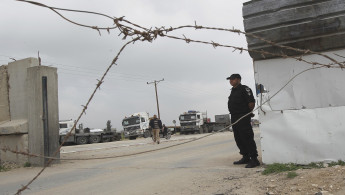Was Iran behind the opening of Rafah's border crossing?
Was Iran behind the opening of Rafah's border crossing?
Analysis: The temporary opening of the Rafah border crossing, attributed to the Islamic Jihad group, has brought relief to many Gazans.
3 min read
The Rafah border crossing has been temporarily reopened [al-Araby]
While the Palestinian Islamic Jihad movement is an important and influential group, drawing significant support from among Palestinians and others in the region, it is not the recognised representative of the Palestinian people.
Nor has it ever won elections held in the occupied territories.
So eyebrows were raised when the Egyptian leadership decided to receive an Islamic Jihad delegation, and open the long-closed Rafah Crossing upon its request. Would Egypt have responded to a similar request had it been made, for example, by the Popular Front for the Liberation of Palestine?
Why was the crossing not opened for the sake of Palestinian President Mahmoud Abbas or ousted Fatah leader Mohammad Dahlan - who both have close ties with the Egyptian leadership? Why did Egypt only accept Islamic Jihad's mediation to reopen the crossing?
Does Egypt want to create a rift between Islamic Jihad and Hamas, which was recently branded a "terrorist organisation" by an Egyptian court?
No, this is not a convincing reason.
After all, both movements have strong relations with each other and have coordinated their efforts in and on various fields. They also cooperated to deter Israel's aggression on Gaza last summer.
Hamas has also applauded Islamic Jihad's efforts.
It has emerged that senior Hamas leader Ismail Haniyeh tried to help Islamic Jihad convince Egypt to reopen the crossing.
In his Friday sermon, Haniyeh struck a conciliatory tone towards Egypt after months of heightenign tensions. Immediately afterwards, Egypt opened the crossing.
The most realistic reason for Cairo's friendliness towards Islamic Jihad, in my opinion, is the relationship between the Gaza-based group and Iran.
The close relations between them are no secret. A Houthi delegation, also thought to be supported by Tehran, also recently visited Cairo, and several media outlets spoke of an Iranian-Egyptian rapprochement.
Egyptian journalists have also hinted at the possibility even of aligning with Iran, in a response to the emerging Saudi-Turkish axis.
An Egyptian-Iranian thaw hinges on circumstances and the balance of power, Abdul Munim Said, chairman of Cairo's Regional Centre for Strategic Studies, told the Egyptian Al-Fajr newspaper.
"It is not difficult just because of the Iranian-US nuclear dispute, but because this dispute also applies to Saudi Arabia and the UAE," Said argued.
He also said circumstances could change and that a solution to the Syrian crisis could necessitate an Iranian-Egyptian deal. "I believe it is necessary to keep channels of communication open with everyone," he added.
Gazans don't appear to mind too much who was behind the partial opening of the crossing.
They just hope the Islamic Jihad movement continues to work towards agreements that alleviate the people's suffering.
This article is an edited translation from our Arabic edition.
Nor has it ever won elections held in the occupied territories.
So eyebrows were raised when the Egyptian leadership decided to receive an Islamic Jihad delegation, and open the long-closed Rafah Crossing upon its request. Would Egypt have responded to a similar request had it been made, for example, by the Popular Front for the Liberation of Palestine?
Why was the crossing not opened for the sake of Palestinian President Mahmoud Abbas or ousted Fatah leader Mohammad Dahlan - who both have close ties with the Egyptian leadership? Why did Egypt only accept Islamic Jihad's mediation to reopen the crossing?
Does Egypt want to create a rift between Islamic Jihad and Hamas, which was recently branded a "terrorist organisation" by an Egyptian court?
No, this is not a convincing reason.
After all, both movements have strong relations with each other and have coordinated their efforts in and on various fields. They also cooperated to deter Israel's aggression on Gaza last summer.
| Does Egypt want to create a rift between Islamic Jihad and Hamas? |
Hamas has also applauded Islamic Jihad's efforts.
It has emerged that senior Hamas leader Ismail Haniyeh tried to help Islamic Jihad convince Egypt to reopen the crossing.
In his Friday sermon, Haniyeh struck a conciliatory tone towards Egypt after months of heightenign tensions. Immediately afterwards, Egypt opened the crossing.
The most realistic reason for Cairo's friendliness towards Islamic Jihad, in my opinion, is the relationship between the Gaza-based group and Iran.
The close relations between them are no secret. A Houthi delegation, also thought to be supported by Tehran, also recently visited Cairo, and several media outlets spoke of an Iranian-Egyptian rapprochement.
Egyptian journalists have also hinted at the possibility even of aligning with Iran, in a response to the emerging Saudi-Turkish axis.
An Egyptian-Iranian thaw hinges on circumstances and the balance of power, Abdul Munim Said, chairman of Cairo's Regional Centre for Strategic Studies, told the Egyptian Al-Fajr newspaper.
"It is not difficult just because of the Iranian-US nuclear dispute, but because this dispute also applies to Saudi Arabia and the UAE," Said argued.
He also said circumstances could change and that a solution to the Syrian crisis could necessitate an Iranian-Egyptian deal. "I believe it is necessary to keep channels of communication open with everyone," he added.
Gazans don't appear to mind too much who was behind the partial opening of the crossing.
They just hope the Islamic Jihad movement continues to work towards agreements that alleviate the people's suffering.
This article is an edited translation from our Arabic edition.



